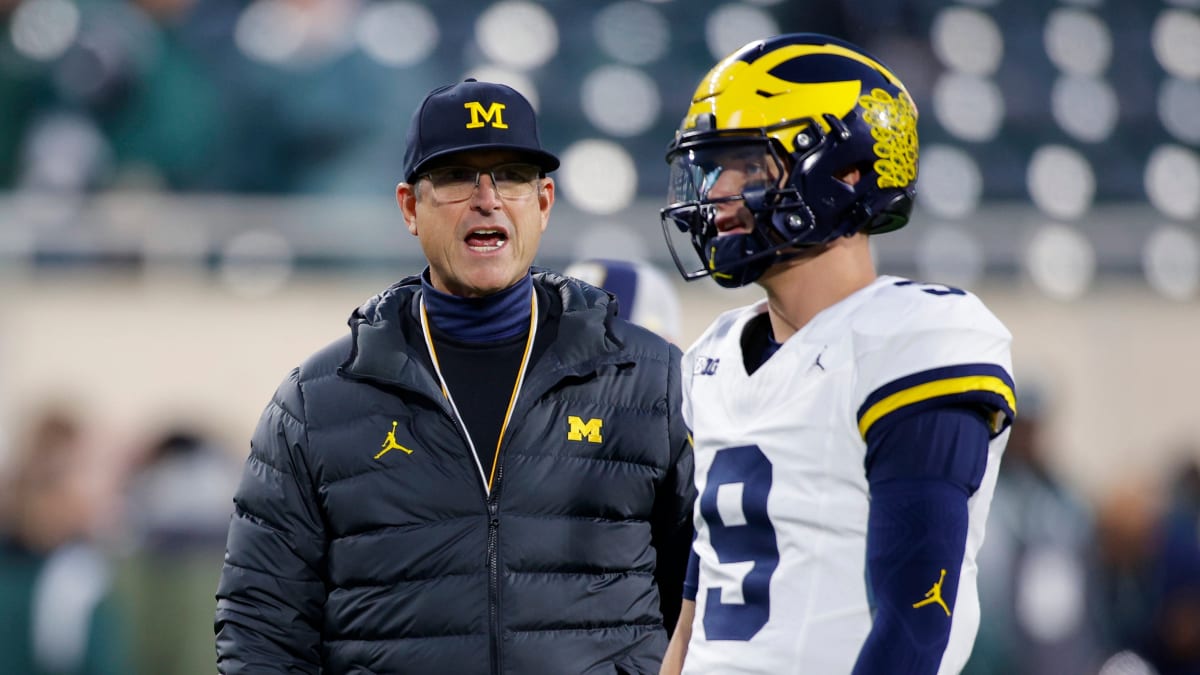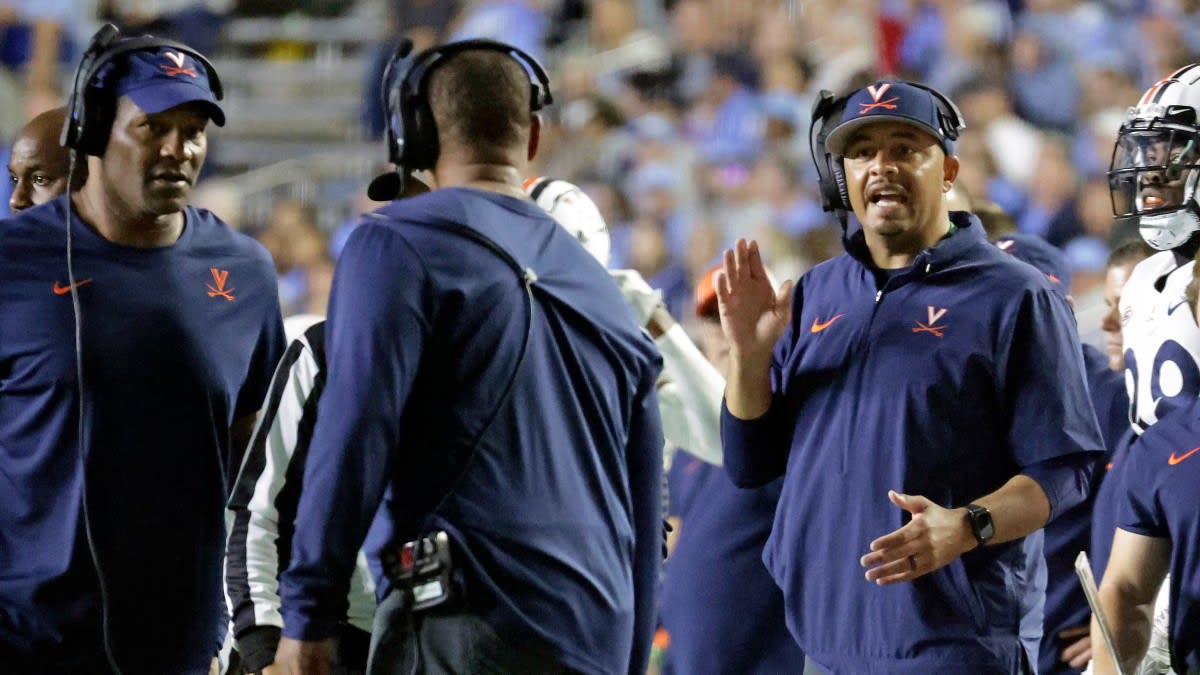Forty names, games, teams and minutiae making news in college football, where this press conference repartee between Marcus Freeman and a reporter is one of the better moments of the season:
First Quarter: Top Coaches-Gone-Wild Moments | Second Quarter: October Revivals | Third Quarter: 2023’s Best (and Worst) Coaches
Fourth Quarter: The Ante Has Been Upped in Ann Arbor
Of all the eye-opening details in ESPN’s story Monday on problematic Michigan Man Connor Stalions (30), this one should reinforce a sense of immediacy and urgency to the school, the Big Ten and the NCAA: “Sources confirmed to ESPN that Stalions purchased tickets on both sides of the stadium—across from each bench—for Ohio State’s game with Penn State on Saturday. Michigan plays both teams in upcoming weeks. According to sources, the tickets purchased by Stalions were not used Saturday.”
The point here: The Wolverines’ alleged impermissible in-person scouting was a present-tense activity until very recently. The Stalions Scouting Service, brought to you by Ticketmaster and a gung-ho former Marine who is no criminal mastermind, planned to have people in The Horseshoe to put eyeballs (and perhaps phone video) on MIchigan’s two main conference competitors. Tickets were bought and used for other games this season as well. The 2023 season is affected. The cloud over Ann Arbor is visible.
MIchigan’s undefeated, dominant run is playing out amid an increasingly loud controversy. That ups the ante on all involved institutions to adjudicate it swiftly—fairly, to be sure, but also with as much speed as can responsibly be asked.
The NCAA (31) must make a determination on the nature of these potential violations. If this is deemed strictly a playing-rules case, NCAA Enforcement can wash its hands and kick it to the Big Ten office, which could be on the hook to make a massive decision fraught with peril on all sides. That doesn’t seem like the most probable route at this point.

Al Goldis/AP
ESPN says video evidence of the impermissible scouting is being sent to the NCAA this week; after that’s received and reviewed, it shouldn’t take long for Enforcement to make a processing decision (which might not be publicly disclosed). If there is supporting evidence of an extensive, ongoing and very purposeful attempt to gain a competitive advantage, it’s likely that this would be processed as a bylaw infraction case. That increases the exposure to sanctions for Michigan and also extends the timeline by months. (The potential severity of an infractions case has been addressed here; for purposes of this exercise we’ll focus more on timeline and oversight.)
A full-blown investigation, with a Notice of Allegations and responses and a Committee on Infractions hearing, would let this season play out before the Wolverines would have to pay the penalty piper—if indeed they ever have to pay. A lengthy NCAA inquiry would, in turn, toss this hot potato into the lap of Big Ten commissioner Tony Petitti (32), who has been on the job for all of five months.
If the Big Ten has hard evidence that Michigan impermissibly spied on other conference teams, the level of outrage in the league stands to be enormous, and the calls for immediate action stand to be forceful. In theory, Big Ten members could ask for Michigan’s three conference games played before this blew up to be ruled forfeits or no-contests. (Is there an actual mechanism within the conference rules to do such a thing? Don’t know.)
Would the Big Ten preempt the NCAA to punish its best team during the season, sending The Mitten into a meltdown? Would it play stall ball to avoid punishing its best team, alienating its 13 other schools in the process? Would Fox execs have a collective stroke if the Big Ten killed its own golden goose? How about ESPN, which is already dreaming of Michigan-sized ratings come playoff time? Good luck to the commissioner.
Of course, the first line of response really belongs to the Michigan administration (33), which has put out some swell statements about integrity and so forth. What’s said and what’s done often are two different things, and the school has a great ardor to win its first football national championship since 1997. This team represents its best chance to do so since that season—Jim Harbaugh (34) himself declared in the spring that this is the best Michigan team he’s been around.
The administration at an elite academic school is having its tolerance for athletic scandal tested. Remember, Harbaugh already served a three-game, school-imposed suspension to start this season for another NCAA investigation. That highly publicized and contentious case will continue into 2024 with the potential for bigger penalties.
Then there is the murky ongoing investigation of former offensive coordinator Matt Weiss (35), who was first suspended and then dismissed last winter amid a University of Michigan Police Department investigation into a “computer access crime” originating out of the Wolverines’ football facility. Melissa Overton, deputy chief of UMPD, told Sports Illustrated on Monday that the Weiss case is “still under investigation.” She added that the inquiry is “not at all associated” with the Connor Stalions inquiry.
Three investigations, one program, one year. Auburn is impressed.
Plenty of Michigan fans will argue that the Stalions case doesn’t fall in the “scandal” category to begin with. (It’s been quite a pivot from “no proof” to “no big deal” as more detailed stories have emerged.) The in-person scouting rule originated as a form of cost containment, and there is little, if any, precedent for violations of it resulting in NCAA infractions cases. But that also could be because we haven’t seen a program do anything this audacious, extensive and, yes, reckless.
At the moment, it’s incumbent upon all involved parties to step up and step on the accelerator to at least ascertain the facts. Then we’ll see where the accountability lies.
Drive for 325 Update
Each week The Dash is updating the progress of Iowa offensive coordinator and nepo baby Brian Ferentz (36) toward fulfilling contractual obligations that call for the Hawkeyes to average 25 points per game. That’s a total of 325 points across 13 games. After last year’s offensively challenged team wheezed its way to 17.7 points per game, improvement was mandated—and put in writing. The update through eight games:
- Last week: Iowa lost a prehistoric slog amid controversial circumstances to Minnesota, with a potential game-winning punt return touchdown (of course!) wiped out on an obscure but correct ruling of an invalid fair catch signal by Cooper DeJean.
- Points scored: 10, with three points on the opening drive and seven late in the second quarter and exactly zero thereafter. The Hawkeyes had 127 total yards, which if it weren’t for the 76 against Penn State would have been the program’s fewest since 2017. Iowa remains last in the nation in total offense and pass efficiency.
- Average points through eight games: 19.5, now slipping 5.5 below the Mendoza line.
- Average points attributable to the offense: 17.3. Percentage of Iowa points this season that are not attributable to the Iowa offense but still countable toward Ferentz’s contract: 11.5%.
Number of points needed the rest of the way to reach the target: 169. The Hawks need to average 33.8 through the next five games, which flat-out isn’t happening.
- Next up: an open date, in which Team Ferentz is absolutely negligent if it doesn’t experiment with Cooper DeJean (37) on offense. The waved-off touchdown would have been his fifth in college, which is pretty strong for a defensive back–kick returner. Travis Hunter has shown what a two-way player can do at Colorado, and Iowa has a desperate need for a playmaker of any kind on offense. Give DeJean a chance to catch some passes, run some reverses, whatever. Continuing with the current inept attack is like giving up.

Chris Seward/AP
Coach Who Earned His Comp Car This Week
Tony Elliott (38), Virginia. His tenure started 4–12 and included the kind of tragedy no coach could ever prepare for, with three of his players murdered last November. Upsetting North Carolina as a 24-point underdog Saturday doesn’t change anything that happened, but it provided a great football rallying point for Elliott and his program going forward.







